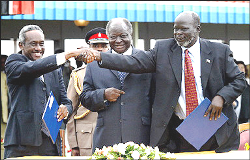Southern Sudan peace talks due to start Friday
NAIROBI, Nov 25 (AFP) — Officials from Sudan’s government and main southern rebel movement are due resume talks in Kenya on Friday amid rebel doubts over Khartoum’s commitment to sign a comprehensive accord by the end of the year.

|
|
Kenya’s president Mwai Kibaki (C) watches Sudan vice-president Ali Osman Taha (L) and leader of Sudan People Liberation Army John Garang shake hands after they signed the Nairobi Declaration on the Final Phase on Peace in Sudan at State house Nairobi. June 5, 2004 (AFP). |
The UN Security Council last week moved to Nairobi and extracted a written promise from the government and rebel Sudan People’s Liberation Movement/Army to sign the deal ending 21 years of war by December 31.
Two intense years of negotiations have already delivered agreements on key issues such as sharing of power and wealth, leaving only details of a permanent ceasefire and technical security measures still on the table.
At least 1.5 million people have been killed in the war and over four million displaced.
Friday’s talks will bring lowel-level delegates together until Vice President Ali Osman Taha and SPLM/A leader John Garang go head to head again on December 6.
“We don’t trust that Khartoum is determined” to meet the deadline, one SPLM/A negotiator told AFP, asking not to be named.
“There is nothing in the UN resolution (passed in Nairobi) that can push them to sign a peace agreement,” he added.
“We are committed to talks, but we hope the government will be serious this time round,” SPLM/A spokesman Samson Kwaje told AFP by phone.
A government negotiator said he had “no comment” to make on the rebels’ skepticism.
Last year, Garang and Taha failed to live up to an earlier pledge to US Secretary of State Colin Powell to strike a final deal by the end of 2003.
Since then, Washington has been heaping pressure on both sides to wrap up the talks.
The war in Sudan, Africa’s largest nation, erupted in 1983 when southern rebels rose up against Khartoum to end Arab and Muslim domination and marginalisation of the black, animist and Christian south.
Control of resources, notably Sudan’s large reserves of oil, have played an increasing role in the war over recent years.
While the north-south deal does not directly address a separate conflict in the western region of Darfur, the Security Council resolution expressed the hope that the pact’s decentralisation provisions would help ease what the UN has described as the world’s worst humanitarian crisis.
Tens of thousands have been killed and up to 1.6 million others displaced by the 21-month Darfur conflict that erupted in February 2003, when rebels rose up in the western part of Sudan for similar reasons that drove their southern counterparts to war against Khartoum more than 20 years ago.
Recent days have seen an escalation in fighting in Darfur and on Thursday the WFP announced it had been forced to halt operations in the state of North Darfur because of growing insecurity.
